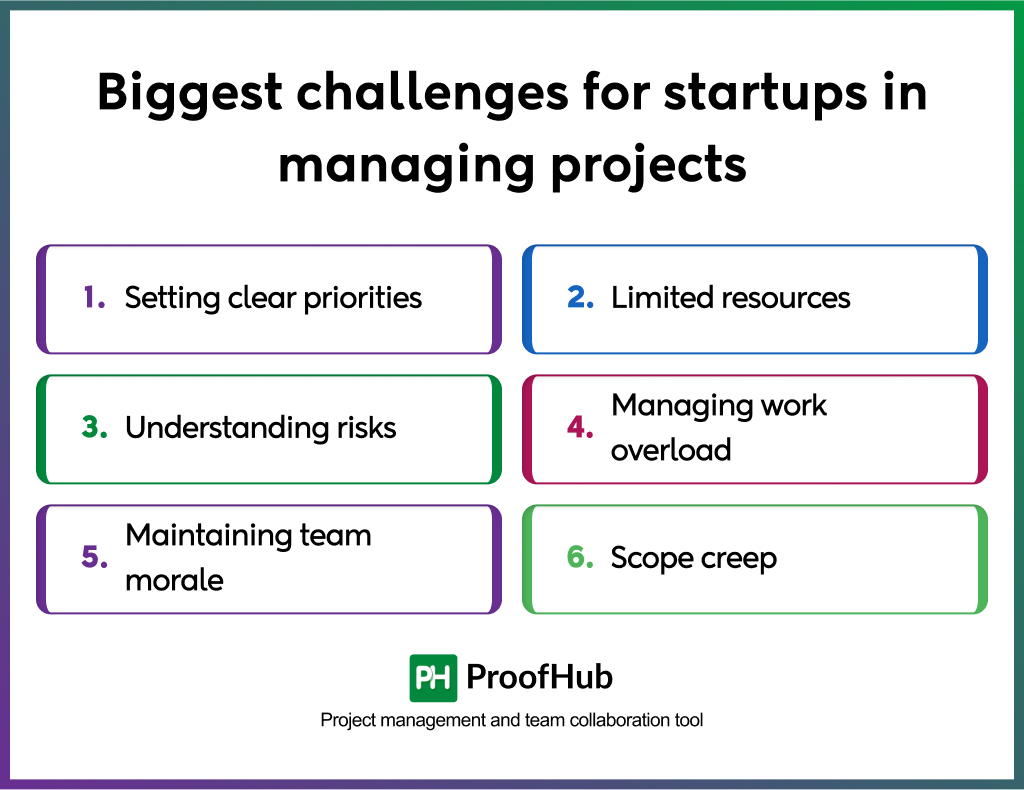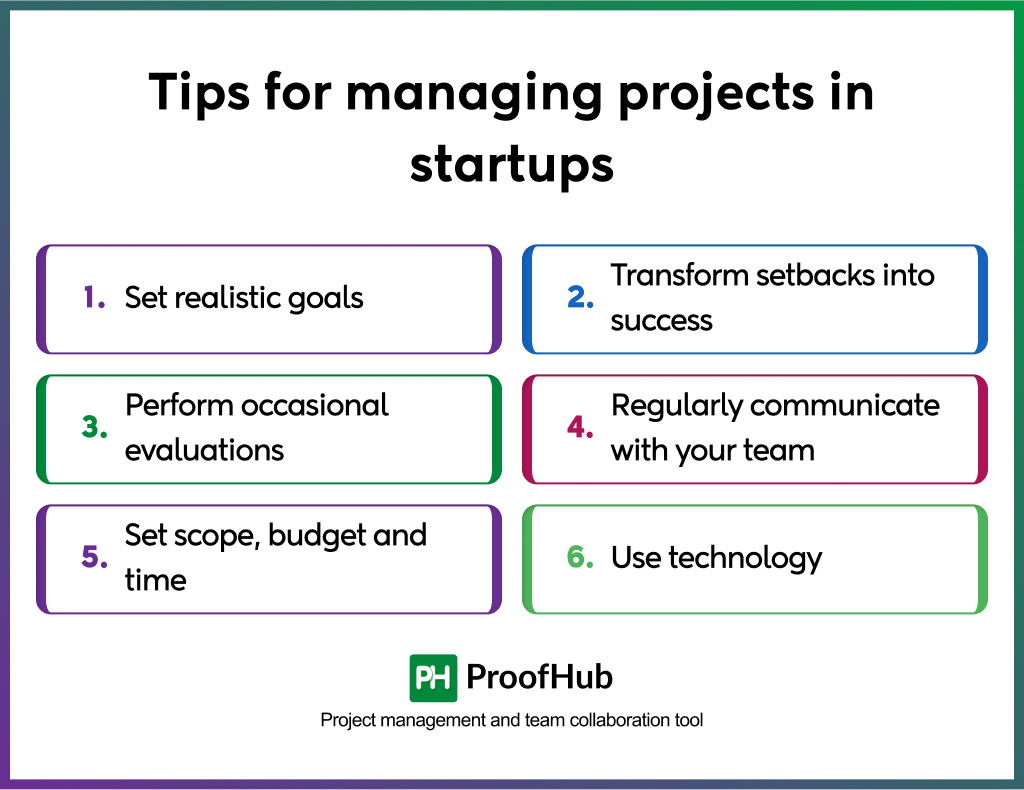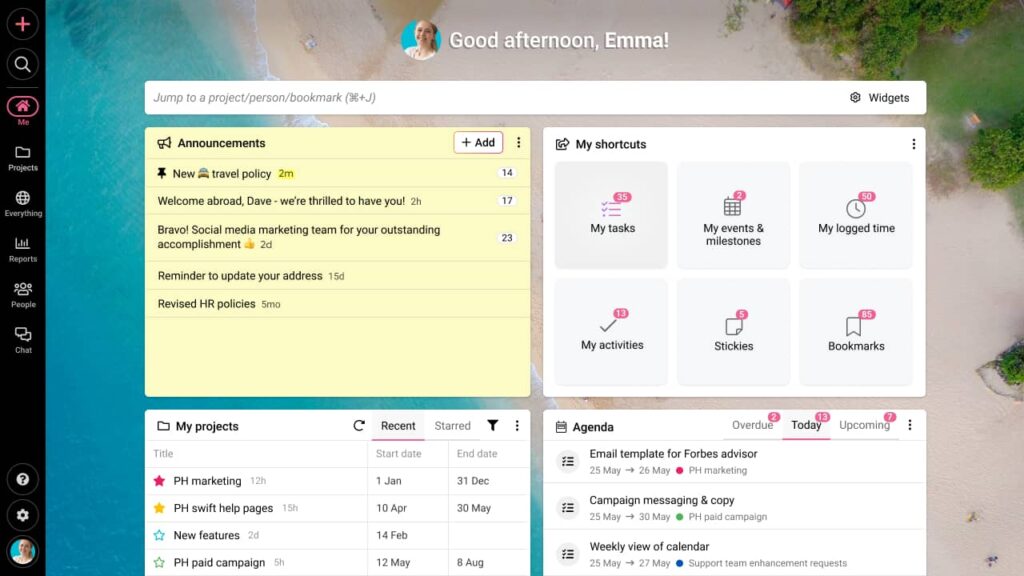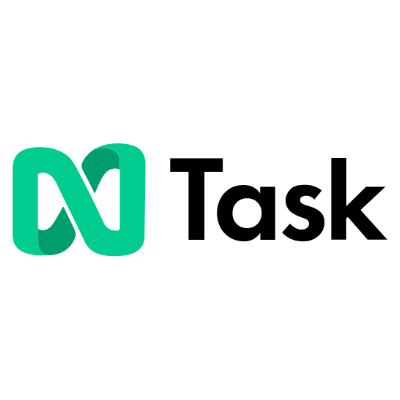Startups are early-stage businesses that aim to make their mark in competitive markets. Despite the enthusiasm and imagination they bring to the table, common struggles like missed deadlines, constant multitasking, poor time management, tight budgets, limited resources, and their effective utilization make survival hard.
I have been there. Regardless of the strategic vision, passion, and hard work we had, everyone was juggling multiple roles, putting out fires, and working tirelessly to sustain momentum. However, it often felt like we were running in circles. Reason? A structure was missing.
With all the chaos and distortions, bringing order to our workflows became necessary. Without a system to manage tasks, track progress, and ensure accountability, it is easy to lose sight of the ultimate goals. And that is when we turned to project management to operate optimally and scale efficiently.
Project management for startups is a process of staying organized and managing projects from beginning to end. From setting goals and allocating tasks to monitoring progress and meeting deadlines, it helps startups consistently deliver the best work possible.
In this article, we will explore why project management is essential for startups, the unique challenges it addresses, the right methodology and tips that work, and how the right tools, like ProofHub, can make all the difference. Whether you’re launching your startup or looking to take it to the next level, investing in project management is the right thing to do to reach success.
Why project management is important in startups?
Many start-up founders fail to recognize the critical impact project management or lack thereof, can have on the success of their venture, missing out on its numerous benefits. And honestly, I get it. It is obvious to hesitate when limitations and aspirations are both high.
The mentality is rooted in the belief that the traditional ad-hoc processes are sufficient to keep the ball rolling, and project management is just another time-consuming overhead that will mess up their routine. Additionally, it often appears unnecessary, especially for bootstrapped start-ups, prioritizing short-term survival over long-term efficiency.
However, regardless of the misconception, project management provides the structure and discipline necessary to stay consistent, disciplined, and effective. Here is why it is essential:
- Set clear goals: Project management helps startups define clear objectives, roles, responsibilities, milestones, and expectations so that everyone understands priorities and stays on the same page.
- Ensure alignment: Having a structured framework in place ensures that everyone on the team aligns their efforts to achieve the defined vision.
- Improved collaboration: With proper project management systems or practices in place, discussions tend to be focused, actionable, and streamlined, eliminating any scope for confusion, miscommunication, and misunderstanding.
- Manage time effectively: Project management helps startups optimize their time management by setting realistic timelines, tracking progress, and addressing bottlenecks, ensuring critical deadlines are met without the risk of delays.
- Effective resource utilization: By allowing you to prioritize tasks, balance workload, and track resource utilization across multiple projects, project management ensures resources are optimized, avoiding duplicate work, burnout, and wastage.
- Enhanced productivity: When team members have a clear understanding of what needs to be achieved, when, by whom, and by what time, they are less prone to making errors and achieve more with optimal efficiency.
Implementing project management in the right place leaves almost no room for error. Moreover, it provides the necessary frameworks to manage everything effectively, ensuring you stay on track even when things don’t go as planned.
Biggest challenges for startups in managing projects
Every business comes across challenges almost all the time. However, the initial phase can be a little more demanding. While every start-up has its own unique set of challenges, some common hurdles persist across industries.

Whether it’s lacking enough budgets, struggling with inexperience in project management, or building a customer base, every startup experiences these difficulties, regardless of the sector or size.
Here are a few key challenges to mention:
- Setting clear priorities: With countless tasks going on and limited resources, identifying which task should be given the highest attention so that it delivers maximum impact on growth becomes pretty difficult. When startups lack understanding of what to prioritize, they often miss out on key opportunities and focus on something that won’t necessarily move the needle.
- Limited resources: Of course, startups often lack initial resource investment upfront, be it in terms of time, money, technology, or workforce, making it more about survival than playing the game. However, regardless of the constraints, the real challenges do not come from not having enough resources but not ensuring their mindful usage.
- Understanding risks: Where starting a new startup is a risk in itself, managing the project risks is another challenge that can make or break your progress. Only by understanding potential risks and their impacts can you make contingency plans and take precautionary measures to ensure the project reaches its final stage successfully.
- Managing work overload: In high-pressure environments where everyone is supposed to handle multiple roles and responsibilities, getting work done takes priority over managing their workload. However, it is a recipe for burnout that can cause frequent quality issues, delays, or missed deadlines.
- Maintaining team morale: In startups, where every task demands peak performance at all times, teams often face stress, burnout, and exhaustion. No matter if you have a great team, low morale can lead to high turnover rates. And this is extremely problematic as the cost per each new job vacancy has increased 14% from 2019 to 2023, to be $4700.
- Scope creep: Even if you start with a well-defined plan, changing project requirements, stakeholder demands, and shifting priorities can throw your efforts off track. Not only this, scope creep can derail timelines and budgets, excessive resource stretch, and shifting project deadlines.
Which project management methodologies are best for startups?
Project management methodology helps startups structure workflows and achieve the maximum out of their efforts to promote sustainable operations. With that in mind, it is important to note that your methodology should serve your goals in a startup environment, not the other way around.
There is no right or wrong way to choose a project management methodology for your business. Start simple and evolve. Evaluate your aim and what works best for your team to meet those requirements.
The most important factor isn’t which framework you choose but how it aligns with how your team naturally works and thinks. Be willing to adapt and blend different approaches based on what actually moves you toward your objectives.
Here is a list of the best project management methodologies that startups can adopt as per their needs:
1. Agile
Agile is not a single methodology but rather an overarching philosophy or framework defined by the Agile Manifesto that emphasizes iterative and incremental development through collaboration. This means that the entire project is divided into smaller, manageable cycles called sprints, leaving scope for teams to self-organize themselves and adjust their approach based on feedback.
How can Agile work for startups?
Startups that operate with Agile mindset can quickly take into account customer feedback and market changes to adjust their approaches in time, ensuring value and quality outcomes are provided. The framework encourages experimentation, learning from failures, and continuous improvement – all crucial for startup success. Teams can deliver value incrementally while maintaining the flexibility to shift priorities based on customer needs and market demands.
Dive into our comprehensive guide to learn everything you need to know about Agile project management!
2. Scrum
Scrum is a popular project management methodology used mostly by software development teams. The framework allows teams to break down complex projects into short, manageable tasks, each to be covered in time-boxed, iterative cycles, called ‘Sprints’. Backlog, Daily stand-ups, Sprint planning, and Retrospectives are some of the key components of Scrum.
How can Scrum work for startups?
Scrum helps startups maintain focus, accountability, and adaptability. Deliverables are reviewed at the end of each sprint, encouraging frequent adjustments to align with goals and customer needs. This iterative approach ensures that teams stay agile, deliver quality outcomes consistently, and are well-equipped to handle changing requirements or dynamic market conditions.
3. Kanban
Kanban is a visual workflow management method that is focused on lean principles of “just-in-time” delivery to improve efficiency. Also referred to as the Toyota nameplate system, the ideology uses a Kanban board and WIP limits to manage work processes effectively. By allowing teams to visualize their tasks, the Kanban system focuses on identifying the bottlenecks and limiting the excess buildup of work based on the team’s capacity.
How can Kanban work for startups?
Kanban can be great for startups with small, agile teams that prefer visualizing their work instead of using rigid frameworks or overcomplicated tools. The flexible structure of the Kanban system allows teams to prioritize their work effectively, adapt to changes, and keep track of progress in real-time. Moreover, it has the ability to limit work-in-progress and maintain steady operations without overburdening team members or causing delays.
Kanban or Scrum? Discover which one is the best for your projects!
4. Waterfall
Waterfall is one of the oldest project management methodologies known for its simplicity and effectiveness. Also referred to as the Software Development Life Cycle (SDLC), this methodology follows a sequential order to complete a task, leaving no scope for adjustments in between. One can only start the second task when the first task is completed.
How can Waterfall work for startups?
While many modern startups shy away from Waterfall, understanding when it might be the right choice is important.
Waterfall methodology works fine for startups with well-defined requirements and predictable outcomes or when the cost of making changes later is high. For example, if you’re developing hardware or working on projects where safety is critical, the detailed planning and documentation in Waterfall can help prevent costly mistakes. The key is to recognize that while Waterfall might not suit your entire startup, it could be perfect for processes within your projects, where predictability matters more than flexibility.
5. Lean
Lean is a project management methodology aiming to maximize value and reduce waste without compromising the overall efficiency of the process. The basic principle is to remove ‘Muda’ (waste), ‘Mura’ (variability), and ‘Muri’ (overburden), that doesn’t add value to the customer or the workflow. While it borrows from traditional manufacturing principles, it does leave scope for adjustments based on feedback and learning.
How can Lean work for startups?
Lean helps startups continually improve their processes by identifying and rectifying inefficiencies through multiple iterations and customer feedback. It helps teams deliver high-quality outcomes and increase overall productivity and customer satisfaction, making it a practical choice for startups aiming for sustainable growth.
Read more – Lean project management: Definition, benefits, principles & tools
Since now you know about project management methodologies, here are some things to consider to find the best one for your business. What might be a right fit for someone may not be as beneficial to you as it is to them.
- How is your business structured?
- What is the size of your organization?
- What are your goals?
- How complex is your project?
- What do you expect from the final deliverables?
- Do your clients/customers prefer a particular methodology?
It is crucial to ask yourself these questions as what might be a right fit for someone else, may not be as beneficial to you as it is to them.
After you’ve picked the right method, let’s look at the project management tips and tricks for startup companies that can help turn your startup into a successful business.
Explore project management methodologies to deliver your projects successfully!
Tips for managing projects in startups

Here are some essential steps startups can take to stay on track and succeed.
1. Set realistic goals
“The victory of success is half won when one gains the habit of setting goals and achieving them. Even the most tedious chore will become endurable as you parade through each day convinced that every task, no matter how menial or boring, brings you closer to fulfilling your dreams.” – Og Mandino
For startups, setting realistic goals is about establishing a clear vision they aim to achieve with focused efforts and deliberate actions. As unrealistic expectations but also a detriment to your momentum and overall growth.
It is not just about defining an end goal and directing your team towards achieving it without considering practicality, but setting meaningful, measurable, and achievable goals that make sense to everyone and don’t demoralize your team. This means every step you take is intentional and drives you closer to long-term success.
Start with laying a strong foundation.
- Identify your vision
- Develop a solid project plan
- Maintain long-sight while not taking smaller wins for granted.
- Be proactive, spontaneous, and adaptive
Ask yourself these questions to stay on track:
- What is the core purpose of my long-term goal?
- What actionable steps will help me achieve this goal?
- How can I build upon these actions to sustain momentum?
2. Transform setbacks into success
When you set up your journey as an entrepreneur, you choose to realize and shape your vision. Be it stakeholder complaints, internal conflicts, missed deadlines, and budget overruns, how you approach challenges talks a lot about your resilience and willingness to succeed.
On a path where both success and setbacks can come your way, staying consistent is the key to being in the race. Do not fear obstacles, instead see them as opportunities for growth and success. Take inspiration from small wins and continue confidently moving ahead to maintain momentum.
3. Perform occasional evaluations
In your pursuit to guide your startup into a well-established business, take occasional time out to step back and reflect. Evaluate your current performance standards, identify potential challenges, and spot areas that can be improved for maximum efficiency.
You can also check in with your employees to understand their insights, gauge team performance, and seek feedback. After gathering all these insights, strategize to determine what can be refined to optimize processes and ensure alignment to better prepare for future growth.
4. Regularly communicate with your team
To ensure projects reach the final stage without any hiccups, make sure to establish clear communication channels for your team to stay in sync. Keep in mind that effective communication in project management directly leads to better project outcomes.
Encourage your team to engage with each other and operate as a unit actively. Regular and effective team communication ensures that everyone is informed and in-sync at every step of the project, ensuring seamless progress. Communication is not just about talking and hearing; it is about being accessible, recognizing challenges, and understanding the complete ins and outs of a project.
“Poorly managed tasks ruining your productivity? Start using ProofHub!”
5. Set scope, budget and time
Defining scope, budget, and time is essential for startups to keep their projects on track. These three elements – often called triple constraints– are crucial in tracking the project progress and ensuring seamless execution.
- Time: A metric defines the total time required for project completion. Project management tools, such as those offering Gantt charts, are perfect for helping startups plan and efficiently track their project’s progress against timelines. This helps identify potential bottlenecks and delays.
- Scope: The scope of a project defines the specific requirements, such as deliverables, features, functionalities, and limitations. Being aligned on scope with stakeholders is essential to ensure that the project is completed within the specific time and budget.
- Cost: Creating an accurate cost baseline is essential for effective project management. It includes all project costs, including material, equipment, technology, and personnel. Due to a lack of enough resources at their disposal, allocating funds carefully is necessary to avoid running out of money and maintain financial stability.
6. Use technology
When establishing a scaling business, keep in mind that you have to focus on smart work and not hard work. Do not keep yourself indulged in tasks that technology can complete in a matter of moments. If you keep on manually handling everything, you will surely find yourself running in circles without making any real progress.
Therefore, make sure to invest in technology to automate ad hoc, recurring, and repetitive tasks, reducing manual efforts, minimizing errors, and boosting overall efficiency. Remember, your time matters, and you must allocate it wisely to solutions that provide long-term value.
What are the best tools for startups?
Project management tools offer startups essential capabilities to streamline their operations, improve team collaboration, and enhance overall efficiency. Some of the features you should look for in a project management tool are:
- User-friendly interface
- Project planning
- Gantt charts
- Kanban boards
- Reports
- Time tracking
- Centralized file sharing and storage
- Goals and milestones
Here is my recommended best online project management tool list that you can use to do away with chaos.
1. ProofHub

ProofHub is one of the best project management and team collaboration tools that helps you manage projects, tasks, teams, communication, and files in one place, regardless of the size and industry. Designed for businesses of any size and industry, it provides a centralized platform where you can plan, execute, and monitor all aspects of your work.
ProofHub’s flat pricing model with no per-user fee makes it especially attractive to startups. Unlike other tools that charge based on the number of users, ProofHub allows you to scale your team without incurring additional costs. This means you can onboard team members, clients, or external collaborators without worrying about inflated expenses—an essential advantage for startups focused on growth.
Additionally, ProofHub eliminates the need to invest in multiple software solutions. It combines essential features like project management, task management, time tracking, file sharing, real-time collaboration, proofing & approvals, and team communication into a single, intuitive platform. This not only saves costs but also simplifies operations. Your team spends more time delivering results and less time learning different tools, integrating those, or upgrading subscriptions.
The customizable platform allows you to tailor it to your specific needs, enhancing team productivity and alignment. With everything available under one roof, workflows are streamlined, and projects are efficiently delivered on time.
Also, ProofHub makes it possible for startups working with remote teams to collaborate effortlessly with their unique features such as – to-do’s, Gantt chart application, file sharing, project templates, timesheets, recurring tasks, proofing, reporting automatic notifications, and document management.
2. nTask

nTask is a decent project and task management software designed to help teams organize, plan, and track their work effectively. The comprehensive functionality of the app offers features similar to ProofHub but lacks versatility in certain areas. However, its limited communication and collaboration functionalities and advanced task management restricted to paid plans can be a drawback for teams requiring robust all-in-one solutions.
3. ClickUp

ClickUp is a simple and sophisticated work management tool to get things done. With a highly customizable and visually appealing interface, users can tailor it to their needs and preferences. While its low-tier plans are affordable and easy to start with, you can only unlock its advanced features like time tracking, timesheets, and workload management in higher-tier plans.
4. Trello

Trello is a Kanban-based solution ideal for users who prefer a simplistic and visual approach to task management. The tool is widely known for its five-tier hierarchy of workspaces, boards, lists, cards, and checklists. Limited in its own suit set, the tools offer extensive power-ups and integrations that come at an additional cost.
5. Monday.com

Monday.com is an intuitive work management platform that helps teams streamline workflows. It provides features for project management, task management, and resource management. Also, its visual analytics feature called Dashboards provides actionable insights into budgets, timelines, and task progress. With 200+ integration options available, Monday allows you to connect your favorite tools and create a seamless workflow.
Discover the comprehensive list of best project management software for your startups
Conclusion
Success is not a random act; it is intentional. It doesn’t just happen; one has to work for it – consistently, strategically, and with purpose. And startups perfectly embody this mindset, daring to dream big and working relentlessly to bring their vision to life.
While startups may be reluctant to adopt a structured system to manage projects and workflows, a dedicated project management system isn’t about stifling creativity. With the right approach and tools, you can transform disorganization into focus, align your team around shared goals, and ensure every effort moves you closer to success.
Remember it’s never too early for your business to engage in project management. Be it at any stage, you need a project management system to keep your operations aligned, track progress, and ensure goals are met efficiently.

